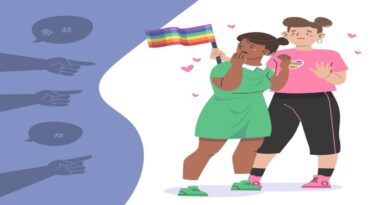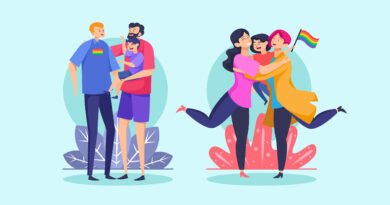Understanding the Spectrum: A Comprehensive Guide to LGBTQ+ Identities
Mental Health Is Important for the LGBTQ+ Group
Diversity in identities and perspectives lie at the core of LGBTQ+. It’s a broad community that encompasses people of various gender identities and expressions, and sexual orientations. Understanding the nuances of queer identities is important to cultivate inclusivity and advocate for LGBTQ+ rights. Discrimination remains a major issue the community faces, which impacts mental health. Online counseling services like TalktoAngel offer a safe and confidential space for LGBTQ+ individuals to express themselves and seek support from certified psychologists.

Defining LGBTQ+
Introduction: The LGBTQ+ community is often misunderstood and overlooked in society. With a lack of proper education and awareness, it’s time we dive into the spectrum of LGBTQ+ identities, sexual orientations, and gender expressions. In this comprehensive guide, we will explore the diverse range of identities in the LGBTQ+ community, so buckle up and let’s get started! Defining LGBTQ+: The term LGBTQ+ stands for Lesbian, Gay, Bisexual, Transgender, Queer and/or Questioning, and others who identify outside of heteronormative and cisnormative identities. LGBTQ+ identities are not a mental health disorder, lifestyle choice, or a phase. Understanding and accepting LGBTQ+ identities is crucial in creating a more inclusive and safer environment. Understanding Sexual Orientation: Sexual orientation refers to the emotional, romantic, or sexual attraction one feels toward others. It is not a choice, and one cannot change their sexual orientation. Sexual orientation is a spectrum, and the most commonly known sexual orientations are heterosexual (attracted to the opposite sex) and homosexual (attracted to the same sex). Others may identify as bisexual (attracted to more than one gender), pansexual (attracted to people regardless of gender), or asexual (no interest in sexual partners). Understanding Gender Identity and Expression: Gender identity differs from biological sex assigned at birth, and refers to how one identifies and feels internally as male, female, non-binary, or another gender identity. Gender expression, on the other hand, is how one expresses themselves externally, whether through clothes, behavior, or presentation. Gender identity and expression can differ from societal norms and stereotypes, but it’s important to respect and validate everyone’s identity and expression. The LGBTQ+ Spectrum: Now that we’ve defined LGBTQ+ identities, sexual orientation, and gender identity and expression, let’s dive into the spectrum of the community. The spectrum denotes the diversity of experiences and identities within the LGBTQ+ community. It’s important to understand and respect individual differences as they are essential to forming an inclusive and welcoming community. Discrimination and Its Impact on the Community: LGBTQ+ individuals face discrimination in several areas, such as healthcare, employment, education, and personal relationships. Discrimination can lead to physical and mental health issues, such as anxiety and depression. It’s important to support and advocate for LGBTQ+ rights to ensure a safe and inclusive environment. Supporting the LGBTQ+ Community: Being an ally means being a supportive and respectful listener, educating oneself, and taking action to advocate for LGBTQ+ rights. Issues such as bullying, homelessness, and mental health problems are prevalent among the community. Awareness of these issues and access to resources for support is crucial in creating a more welcoming community. Online Counseling for the LGBTQ+ Community: Online counseling is a convenient and accessible option for anyone seeking therapy. It’s essential to find a counselor who is knowledgeable and respectful of LGBTQ+ identities and experiences. Online counseling is available for individuals and couples, providing a safe and confidential space to discuss concerns and emotional needs. Wrap-Up: Understanding and accepting the diverse range of LGBTQ+ identities, sexual orientations, and gender expressions is crucial in creating a more inclusive society. Discrimination and lack of education lead to struggles faced by the community. By being an ally and advocating for LGBTQ+ rights, we can create a welcoming and safe environment for all.
The LGBTQ+ Spectrum
The LGBTQ+ Spectrum encompasses the diverse range of identities and experiences within the LGBTQ+ community. Understanding this spectrum is crucial for creating an environment where everyone feels welcome and valued. Defining the spectrum means recognizing that there is no one “right” way to be LGBTQ+. People can identify as gay, lesbian, bisexual, transgender, queer, and more. Each identity represents a unique experience, and it’s important to respect and embrace these differences. Understanding the diversity in the LGBTQ+ community means recognizing that people come from different backgrounds, cultures, and experiences. This diversity is a strength, but it can also lead to challenges and misunderstandings. By acknowledging and celebrating our differences, we can build a stronger, more inclusive community. Discrimination is a harsh reality for many members of the LGBTQ+ community. From overt acts of violence to more subtle forms of discrimination, the impact on individuals and the community as a whole can be devastating. It’s important to advocate for equal rights and opportunities for everyone, regardless of sexual orientation or gender identity. Let’s remember that the LGBTQ+ community is not a monolith. It’s a beautiful, diverse, and ever-evolving spectrum of identities and experiences. By supporting and uplifting each other, we can continue to break down barriers and create a more inclusive world for everyone.

Supporting the LGBTQ+ Community
Supporting the LGBTQ+ Community Being part of the LGBTQ+ community comes with a unique set of challenges, including discrimination and lack of acceptance. It’s essential to understand the issues they face to become a good ally. The stigma associated with their identification is one of the main problems, and it can result in harassment, intimidation, and hate crimes. It affects their mental health, making them more susceptible to anxiety and depression. As a society, we need to support and accept people of all identities equally. Being an ally means standing up against discrimination and actively promoting inclusivity. It’s crucial to educate ourselves and others on LGBTQ+ issues and use inclusive language. It includes using someone’s preferred pronouns and avoiding derogatory slurs. Accessing resources is an essential aspect of helping the LGBTQ+ community. One can support LGBTQ+ organizations by volunteering, donating and actively participating in community events. Resources, such as LGBTQ+ counseling, can help individuals deal with issues specific to their identity. TalktoAngel provides reliable, confidential online counseling with expert psychologists for the LGBTQ+ community. Overall, being an ally involves actively listening to and supporting LGBTQ+ individuals, educating ourselves on their issues, and providing resources to help them feel accepted and included in society.
Online Counseling for the LGBTQ+ Community
TalktoAngel is an online counseling platform that offers a range of benefits such as convenience, flexibility, and accessibility. It allows individuals to receive support from the comfort of their own space and time zone. Finding the right counselor who is trained and experienced in working with the LGBTQ+ community is crucial for successful therapy. TalktoAngel offers customized therapy for the LGBTQ community for individuals, couples, and families. Whether you need help with gender dysphoria or want an LGBTQ-safe therapist for help with general depression or anxiety, they can help. TalktoAngel provides affirmative online therapy services to the LGBTQ+ community, and work to create a safe and welcoming environment for all. Online counseling is the perfect option for LGBTQ+ individuals and couples as it offers privacy and anonymity while respecting their identity and expression.
Conclusion
Understanding the spectrum of LGBTQ+ identities is crucial to promoting inclusivity and support for the community. By defining LGBTQ+ and exploring the diverse spectrum within the community, we gain a deeper understanding of the unique experiences and challenges faced by individuals. Discrimination against the community and the negative impact it can have also highlights the importance of being an ally and accessing resources for support. Online counseling can be a helpful option for those seeking support and guidance, with benefits such as accessibility and the ability to connect with therapists who specialize in LGBTQ+ issues. By working towards greater understanding and support, we can create a more inclusive and accepting society for all.



